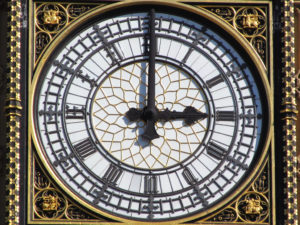
What is Shakespeare’s fascination with three hours? I was at Romeo and Juliet this weekend and this stood out to me:
Ah, poor my lord, what tongue shall smooth thy name,
When I, thy three-hours wife, have mangled it?
Because I thought, “Hmm, that’s interesting because clearly they’ve been married more than three hours so it’s like she’s using that as just a generic term for some length of time. Kind of like how Hamlet does it, doesn’t he?” Actually, I was off on that one:
how cheerfully my mother looks, and father died within these two hours.
Then I thought about that one about, “Better three hours too soon than a minute too late,” from Merry Wives of Windsor. So I got to wondering just how often he used this expression. As it turns out, quite a lot. Some of them could even be literal (such as “the length of time after supper and before bedtime”) but surely not all of them.
Comedies
All’s Well That Ends Well
Ten o’clock: within these three hours ’twill be
time enough to go home.
Love’s Labour’s Lost
And then, to sleep but three hours in the night,
And not be seen to wink of all the day—
A Midsummer Night’s Dream
what dances shall we have,
To wear away this long age of three hours
Between our after-supper and bed-time?
Twelfth Night
Ay, madam, well; for I was bred and born
Not three hours‘ travel from this very place.
Tragedies
Coriolanus
Within these three hours, Tullus,
Alone I fought in your Corioli walls,
And made what work I pleased:
Romeo and Juliet (again)
Now must I to the monument alone;
Within three hours will fair Juliet wake:
Histories
Henry VI Part 1
More than three hours the fight continued;
Where valiant Talbot above human thought
Enacted wonders with his sword and lance:
Romance
Cymbeline
I have read three hours then: mine eyes are weak:
The Tempest
My father
Is hard at study; pray now, rest yourself;
He’s safe for these three hours.How thou hast met us here, who three hours since
Were wreck’d upon this shore;What is this maid with whom thou wast at play?
Your eld’st acquaintance cannot be three hours:

I should search my own site whenever I come up with these. Looks like I skirted around a similar idea back in 2014:
http://www.shakespearegeek.com/2014/03/real-time-tempest.html
As I recall, the number three was considered unlucky at the time. So my best guess is that three was a widely accepted symbol of portent. And there, I think there is some thing about The Bard and three.
Porter
‘Faith sir, we were carousing till the
second cock: and drink, sir, is a great
provoker of three things.’
Then there are all the other threes in the Scottish Play.
thunder chimes three times in greeting
The witches make three predictions:
1 Macbeth will become the thane of Cawdor
2 Banquo’s sons will be in power
3 Macbeth will become the king
“Thrice the brinded cat hath mew’d”
“Thrice and once the hedge-pig whined”
“Thrice to thine and thrice to mine”
Three apparitions shown to MacBeth which include
1 an armed head
2 a bloody child
3 a child wearing a crown and holding a tree
MacBeth was responsible for three of the major murders in the play.
Then there is Loves Labours Lost:
Three pairs of lovers
Three types of love: eros; philos; and agape. During the course of the play, the characters experience all three types.
And how many times does the ghost of Hamlet’s father appear?
Yep.